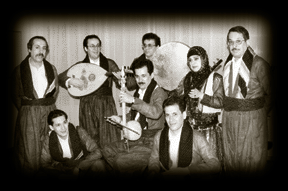 |
 |

|

 Biography: Hooshang Kamkar was born in 1947. He studied at the Faculty of Fine Arts in Tehran, the Sanat Chilipa Academy in Rome, and the University of San Francisco. He is a prolific composer, writer and translator. Among his best known compositions are, The Victory of Bahman, Marigold, God Ship Martyrs, Abidar's Springs and In Memory of Hafez. Bijan Kamkar was born in 1949 and is the lead singer for the group. He also plays tar, robabdaf - the Kurdish drum which he has introduced to the classical Iranian repertoire. He is a graduate of the Faculty of Fine Arts in Tehran. Pashang Kamkar was born in 1951. He plays the santur, and is the conductor of for the group. In 1969 Pashang himself became a santur teacher at the Center Art and Culture in Sanandaj. He studied at the Faculty of Fine Arts and has worked with Sanandaj Radio. Pashang has composed a number of accomplished works, and is one of the founder members of "Shayda". Ghashang Kamkar was born in 1953 and is the only female member of the "brothers" and plays the setar and the violin. She now teaches the [instrument]setar">, [instrument=tombak]tombak and daf - the Kurdish drum which he has introduced to the classical Iranian repertoire. He is a graduate of the Faculty of Fine Arts in Tehran. Pashang Kamkar was born in 1951. He plays the santur, and is the conductor of for the group. In 1969 Pashang himself became a santur teacher at the Center Art and Culture in Sanandaj. He studied at the Faculty of Fine Arts and has worked with Sanandaj Radio. Pashang has composed a number of accomplished works, and is one of the founder members of "Shayda". Ghashang Kamkar was born in 1953 and is the only female member of the "brothers" and plays the setar and the violin. She now teaches the [instrument]setar to the growing number of Iranian women who are interested in becoming musicians. Arjang Kamkar was born in 1956. As a child he was interested in painting, and so came to Tehran in 1978 to study art at the Faculty of Fine Arts. As he lived in a family of musicians, he learned to play the tombak, which he played for many years as a member of the Art and Culture Orchestra of Sanandaj. Arsalan Kamkar was born in 1960. He has played violin in the Tehran Symphony Orchestra, and is also an excellent barbat player. His compositions are regularly performed and include a symphony called The Story of My Father's Land, written with his brother Ardeshir. Ardeshir Kamkar was born in 1962. He came to Tehran in 1980 and continued his study of traditional arrangements by Mohommed Reza Lotfi and his brother Pashang. Ardeshir has always been keen to explore the range and capabilities of the kamancheh, for which he has written a number of pieces and books. Ardavan Kamkar was born in 1968, and was taught to play the santur by his father when he was only four years old. Throughout his childhood he belonged to numerous musical groups, and often appeared on local radio. After seventeen years of santur playing, Ardavan has invented a new technique, and is a gifted soloist and improviser. He has also written a number of pieces and technical etudes for the santur.  Available Works: Kani Sepi (Album) |
|
|
Copyright © 1995-2021 Kereshmeh Records. -- All Rights Reserved.
|
||